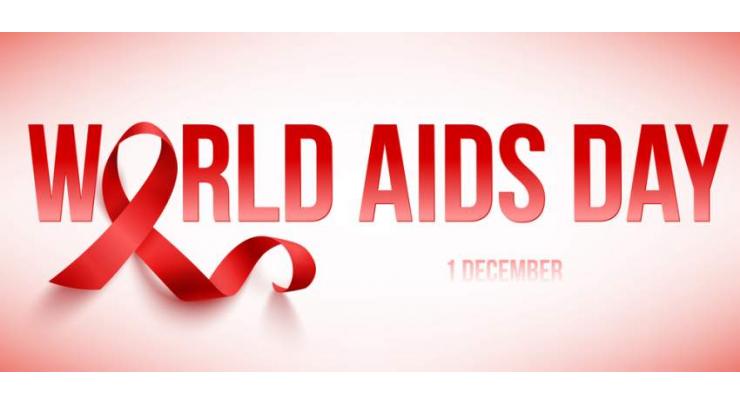
World AIDS Day Observed In Islamabad
Mohammad Ali (@ChaudhryMAli88) Published December 01, 2018 | 09:06 PM

Like other parts of the globe, World AIDS Day was also observed in Pakistan on Saturday to raise awareness about HIV/AIDS and demonstrate international solidarity in the face of the pandemic.
According to WHO, HIV continues to be a major global public health issue, having claimed more than 35 million lives so far. In 2017, 940,000 people died from HIV-related causes globally.
It said that there were approximately 36.9 million people living with HIV at the end of 2017 with 1.8 million people becoming newly infected in 2017 globally.It added 59% of adults and 52% of children living with HIV were receiving lifelong antiretroviral therapy (ART) in 2017.
It said that global ART coverage for pregnant and breastfeeding women living with HIV is high at 80%.
The WHO African Region is the most affected region, with 25.7 million people living with HIV in 2017. The African region also accounts for over two thirds of the global total of new HIV infections.
HIV infection is often diagnosed through rapid diagnostic tests (RDTs), which detect the presence or absence of HIV antibodies. Most often these tests provide same-day test results, which are essential for same day diagnosis and early treatment and care.
WHO said key populations are groups who are at increased risk of HIV irrespective of epidemic type or local context. Key populations often have legal and social issues related to their behaviours that increase vulnerability to HIV and reduce access to testing and treatment programmes.
In 2017, an estimated 47% of new infections occurred among key populations and their partners, it added.
Medical expert, Dr Wasim Khawaja from Pakistan Institute of Medical Sciences (PIMS) said that there is no cure for HIV infection, however, effective antiretroviral (ARV) drugs can control the virus and help prevent transmission so that people with HIV, and those at substantial risk, can enjoy healthy, long and productive lives.
He said that the Human Immunodeficiency Virus (HIV) targets the immune system and weakens people's defence systems against infections and some types of cancer.
He said as the virus destroys and impairs the function of immune cells, infected individuals gradually become immunodeficient. He added immune function is typically measured by CD4 cell count.
He said that immunodeficiency results in increased susceptibility to a wide range of infections, cancers and other diseases that people with healthy immune systems can fight off.
Health expert Dr Sharif Astori from Federal Government Poly Clinic (FGPC) said that the most advanced stage of HIV infection is Acquired Immunodeficiency Syndrome (AIDS), which can take from 2 to 15 years to develop depending on the individual. AIDS is defined by the development of certain cancers, infections, or other severe clinical manifestations, he added.
He said that the symptoms of HIV vary depending on the stage of infection. Though people living with HIV tend to be most infectious in the first few months, many are unaware of their status until later stages, he added.
Dr Astori said that the first few weeks after initial infection, individuals may experience no symptoms or an influenza-like illness including fever, headache, rash, or sore throat.
Related Topics
Recent Stories

Currency Rate In Pakistan - Dollar, Euro, Pound, Riyal Rates On 19 April 2024

Today Gold Rate in Pakistan 19 April 2024

Rock-solid Ruud racks up season-leading win in Barcelona

At UN, Iran says it will make Israel 'regret' reprisals

G7 hears calls for 'critical' Ukraine aid

EU seeks to leverage might to confront China, US challenge

5 Customs officials martyred as their vehicle ambushed by terrorists in D I Khan

Pak-New Zealand match called off due to rain

NHA restores traffic on roads affected by recent rains in Balochistan

China to fully support Pakistan's efforts against terrorism: Ambassador Jiang

U.S. envoy calls on Foreign Minister Ishaq Dar

Poland arrests man over suspected plan to kill Zelensky
More Stories From Health
-

DC calls for intensive anti-polio drive in ICT
17 hours ago -

World Hemophilia Day observed to underscore importance of providing comprehensive care
2 days ago -

Six in a family with heart on the 'right side'
2 days ago -

Diabetic disease increasing rapidly : Dr. Noor Elahi Memon
2 days ago -

World Hemophilia Day observed
2 days ago -

ATC dismisses bail petition of doctor involved in illegal kidneys transplant
10 days ago
-

Dr. Shehzad warns against deviation from WHO guidelines on anti-smoking
10 days ago -

Health activists express concerns over attempts to derail tobacco control
12 days ago -

UHS declares MBBS first prof, MS urology exam results
21 days ago -

Increased diagnostic testing for drug resistance
27 days ago -

IRD releases groundbreaking results of end TB programme
29 days ago -

Increased diagnostic testing for drug resistance TB will enhance patients’ treatment outcome
1 month ago











